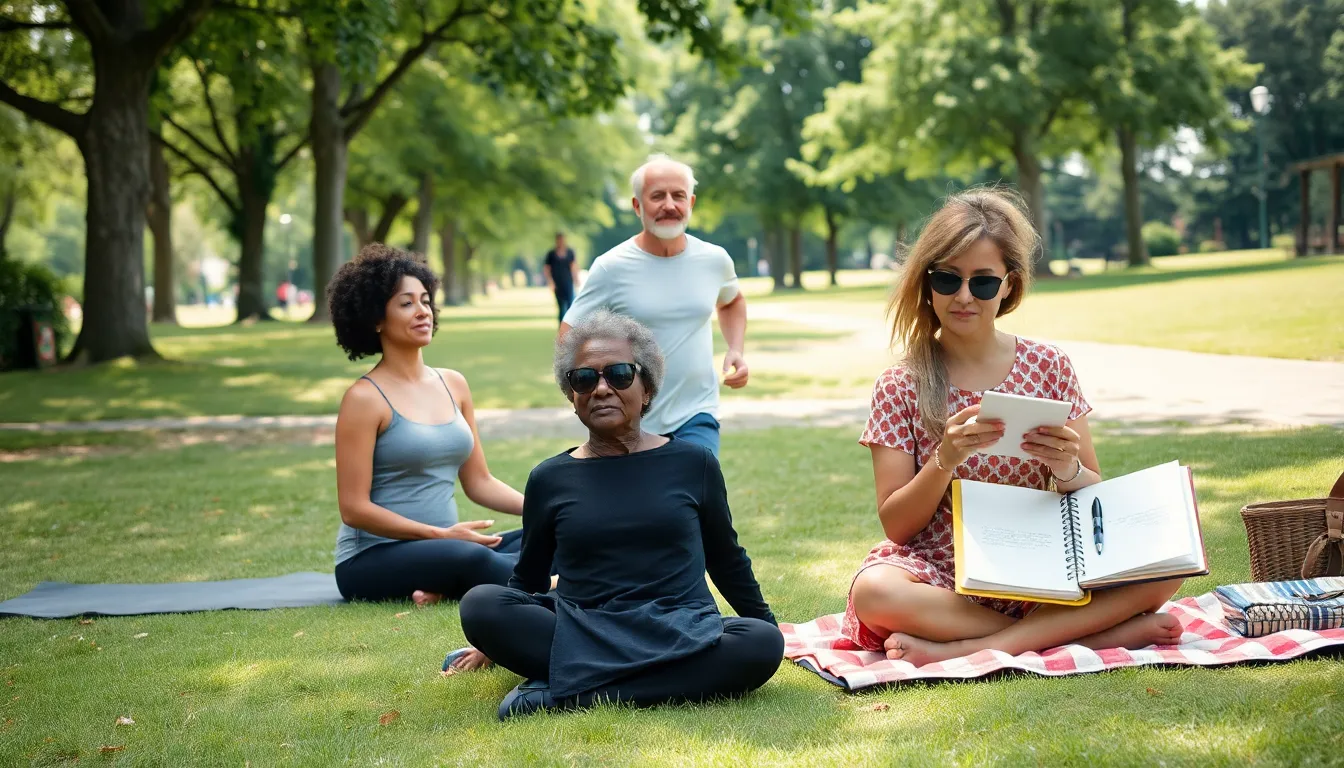In a world that constantly throws curveballs, adaptive living is the secret sauce for thriving, not just surviving. Imagine a life where flexibility reigns supreme, allowing you to roll with the punches like a pro. Whether it’s embracing new technology or adjusting to sudden changes, mastering adaptive living can turn everyday chaos into a symphony of success.
Table of Contents
ToggleUnderstanding Adaptive Living
Adaptive living refers to the ability to adjust one’s behaviors and mindset in response to changing circumstances. This skill involves not only reacting to external changes but also proactively enhancing one’s resilience.
Definition and Concept
Adaptive living encompasses strategies and practices that empower individuals to thrive amid uncertainties. This concept includes embracing change, fostering resilience, and developing problem-solving skills. Individuals cultivating adaptive living understand their environments and navigate life’s complexities effectively. They prioritize learning and growth, enabling them to transform challenges into opportunities.
Importance in Today’s Society
Adaptive living serves as a vital skill set in today’s fast-paced world. Rapid technological advancements and societal shifts demand flexibility from individuals. It impacts personal growth and affects professional success. Those adept at adaptive living build stronger networks, enhance workplace collaboration, and maintain mental well-being. By embracing this approach, people position themselves to manage stress more effectively, ensuring they remain competitive and fulfilled in their lives.
Key Principles of Adaptive Living

Adaptive living requires understanding and implementing key principles that drive resilience and flexibility. These principles form the foundation for navigating life’s uncertainties effectively.
Flexibility and Resilience
Flexibility plays a crucial role in adaptive living. By embracing change, individuals can swiftly adjust to new situations. Resilience complements flexibility by enabling people to bounce back from setbacks. Adapting one’s mindset fosters a more proactive approach toward unexpected challenges. Staying open to new perspectives enhances problem-solving skills, allowing individuals to discover innovative solutions. Each experience of overcoming difficulties strengthens resilience, creating a cycle of growth. This dual focus on flexibility and resilience equips individuals to manage stress better while thriving in diverse environments.
Personalization and Customization
Personalization in adaptive living means tailoring approaches to fit unique circumstances. Understanding individual strengths allows people to create strategies that resonate personally. Customization involves modifying actions based on specific needs, which enhances effectiveness. By recognizing that one-size-fits-all solutions rarely work, adaptive individuals thrive through individualized planning. Making adjustments relies on continuous assessment of outcomes, leading to refined methods over time. Personalized strategies foster a deeper connection to goals, motivating sustained effort. This principle emphasizes that adaptability is not just about a response to change but also focuses on aligning actions with personal identity.
Benefits of Adaptive Living
Adaptive living provides numerous advantages that enhance daily experiences. Individuals often discover an improved quality of life, gaining the ability to meet challenges head-on and adapt to new situations with ease.
Enhanced Quality of Life
Individuals benefit from heightened emotional well-being, often experiencing reduced stress and anxiety levels. Enhanced problem-solving skills lead to better decision-making in both personal and professional contexts. Additionally, greater resilience contributes to a positive mindset, enabling individuals to appreciate and focus on their strengths. Adaptive living fosters deeper relationships as individuals communicate effectively and empathize with others. This connection often leads to increased engagement and fulfillment in various aspects of life.
Increased Independence and Autonomy
Individuals often notice a significant boost in independence when practicing adaptive living techniques. Greater confidence emerges through the ability to handle unexpected changes and challenges. Skills developed through adaptive living empower individuals to make choices aligned with their values and goals. Autonomy can manifest in personal decisions, professional pursuits, and social interactions. With adaptability comes a sense of control over one’s environment, resulting in enhanced self-sufficiency and motivation to pursue individual passions. This increased independence creates a fulfilling lifestyle that promotes personal growth and satisfaction.
Implementing Adaptive Living
Adaptive living can be effectively put into practice through various strategies tailored for individuals and communities.
Strategies for Individuals
Personalizing adaptive living strategies enhances effectiveness. Identifying specific strengths helps create a solid foundation for individual growth. Setting realistic goals fosters motivation and focus. Regularly reflecting on outcomes ensures continuous improvement. Practicing mindfulness techniques reduces anxiety and enhances decision-making skills. Embracing lifelong learning encourages exploration of new ideas and skills. Building a support network provides encouragement and resources for overcoming challenges.
Community and Environmental Considerations
Communities play a vital role in promoting adaptive living. Encouraging collaboration creates a strong support system for individuals. Providing access to resources and information enhances community resilience. Developing adaptive programs and workshops fosters a proactive culture. Engaging in environmental stewardship cultivates a sustainable mindset for residents. Establishing safe, flexible public spaces supports social interaction and creativity. Empowering local initiatives nurtures adaptability through shared experiences and collective growth.
Future of Adaptive Living
Adaptive living continues evolving, shaped by emerging trends and innovations. Individuals and communities increasingly seek smart technologies that enhance flexibility and resilience. For instance, artificial intelligence now aids in personalized learning experiences, helping users adapt more efficiently. Wearable health devices provide real-time feedback, empowering users to make informed lifestyle choices. Moreover, remote work environments foster adaptability by allowing flexible schedules and varied workspaces. As these tools integrate into daily life, adaptability improves overall well-being and productivity.
Trends and Innovations
Technological advancements significantly influence adaptive living. Smart home automation systems enable users to adjust their environments effortlessly, creating spaces that respond to their needs. The rise of virtual reality provides immersive experiences for skills enhancement, allowing individuals to practice problem-solving in simulated scenarios. Increasing collaboration platforms facilitate networking and resource sharing, promoting adaptability through collective support. Furthermore, mental health apps make well-being strategies more accessible, empowering individuals to navigate stress effectively. Innovations in education personalize learning pathways, ensuring each learner can thrive in dynamic settings.
Potential Challenges
Despite the benefits, adaptive living faces specific challenges. Rapid technological changes can overwhelm individuals, leading to resistance or anxiety toward new tools. Not everyone possesses equal access to adaptive technologies, potentially widening the digital divide. Furthermore, persistent societal norms may hinder the implementation of personalized adaptive strategies, as individuals navigate expectations. Resistance to change often arises from comfort in traditional routines, complicating the transition to adaptable practices. Finally, without a supportive community, individuals may struggle to fully embrace adaptive living, highlighting the need for enhanced resources and collaboration.
Embracing adaptive living is vital for thriving in today’s fast-paced world. By cultivating flexibility and resilience individuals can navigate challenges with confidence and transform uncertainty into opportunity. Personalizing strategies further enhances effectiveness allowing for tailored approaches that align with personal strengths and circumstances.
As technology continues to evolve it’s essential to remain open to new tools and methods that foster adaptability. Building supportive networks and engaging with communities can amplify the benefits of adaptive living creating an environment that encourages growth and collaboration. Ultimately those who master adaptive living not only enhance their own lives but also contribute positively to the world around them.





